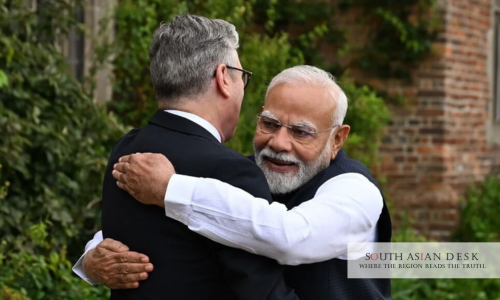London and New Delhi signed a landmark free trade agreement (FTA) on 24 July 2025, promising to reshape India UK trade deal jobs impact through tariff cuts and market access. Prime Minister Keir Starmer and Narendra Modi met in Mumbai on Wednesday to celebrate the deal, attended by over 100 UK business leaders. The pact targets £34 billion in added trade by 2040, boosting employment in tech, manufacturing and services. It takes effect in 2026.
India UK Trade Deal Jobs Impact on Bilateral Economies
The India UK trade deal jobs impact emerges from reduced barriers on goods like whisky, textiles and cars. UK exports to India face fewer duties, while Indian firms gain easier entry to British markets. Official data from the UK Department for Business and Trade (DBT) shows the agreement unlocks £4.8 billion in annual UK GDP growth and £5.1 billion for India. This equates to 0.13% uplift for the UK economy and 0.06% for India in the long run, over 10 to 15 years.
Starmer hailed the deal during his Mumbai visit. “When we leave India tonight, I expect that we will have secured major new investments creating thousands of high-skilled jobs in the sectors of the future,” he said. His office confirmed £6 billion in new Indian investments and export wins, directly creating 2,200 UK jobs across regions. These span advanced manufacturing and digital services, with firms like Rolls-Royce and Diageo leading expansions.
In India, the commerce ministry reported 99% of exports to the UK now duty-free, covering nearly all trade value. Sectors like marine products, textiles and chemicals stand to gain. Piyush Goyal, India’s commerce minister, noted the deal supports labour-intensive industries. Early figures show potential 5% rise in India’s UK market share, fostering local hiring in export hubs.
The agreement also eases business mobility. Indian professionals can work in the UK for up to one year in listed sectors, without new visa routes. This reciprocity aids UK firms too, but officials stress no net migration impact. “Reciprocal business mobility is fundamental in ensuring the UK remains globally competitive,” per DBT guidance.
Employment Opportunities Under India UK FTA
India UK FTA employment opportunities focus on high-growth areas. The deal liberalises services trade, vital for both nations. UK services exports exceed £500 billion yearly, per Office for National Statistics data from February 2025. India, with its 1.4 billion population and rising middle class, offers a vast consumer base. Projections indicate demand for UK imports could surge over the next decade.
One clear win: Scotch whisky tariffs drop from 150%, potentially adding £1 billion in exports and 1,200 UK jobs over five years. Broader India UK FTA employment opportunities include AI, clean energy and defence. Trade ministers agreed on collaboration in advanced manufacturing and digital trade during Wednesday’s talks.
Modi emphasised synergy. “India’s dynamism and the UK’s expertise together create a unique synergy,” he said in Hindi. He added, “Our partnership is built on trust … it is a clear reaffirmation of our shared commitment to … build a brighter future for the people of both our nations.” The Mumbai meeting followed Modi’s July UK visit, where the deal was inked.
Business leaders echoed support. A Grant Thornton survey found 42% of UK firms without Indian presence plan entry within two years; 96% of existing ones aim to expand. “This deal supports those efforts – with 72% of UK businesses surveyed saying that an FTA would encourage them to explore opportunities in the Indian market,” the report states.
For South Asia, the India UK trade deal jobs impact ripples beyond India. Enhanced UK-India ties could draw regional supply chains to Bangladesh and Sri Lanka for textiles, creating indirect employment. Yet core gains stay bilateral, with India’s 5% annual growth fuelling demand.
Sector-Specific Gains and Challenges
Here are the sector-specific gains and challenges:
Technology and Services Boost
India UK FTA employment opportunities shine in tech. Starmer’s delegation included British Telecom and London Stock Exchange Group executives. Investments target AI and advanced communications, projecting thousands of roles. In India, fintech and IT services could see inflows, building on £1.3 billion from 64 Indian firms into the UK.
Manufacturing and Exports
Tariff reductions favour cars and textiles. UK car exports gain from phased duty cuts, while Indian metals and foods enter Britain cheaper. The whisky sector alone promises 1,200 jobs, per DBT. Overall, two-way trade could rise 25.5 billion pounds ($34 billion) by 2040.
Geopolitical notes: Differences on Russia-Ukraine persist, but Starmer affirmed UK’s respect for India’s stance. Scottish Secretary Douglas Alexander said this does not hinder economic ties.
Background: Path to the FTA
Negotiations launched on 13 January 2022 under the prior UK government. Progress stalled until Labour’s 2024 win. Starmer’s team revived talks, concluding on 6 May 2025 via Modi-Starmer call. Signing occurred on 24 July 2025 at Chequers, with Reynolds and Goyal leading.
The pact forms the Comprehensive Economic and Trade Agreement (CETA), covering goods, services and investments. A Double Contributions Convention accompanies it for social security alignment. By April 2025, UK-India trade hit £11 billion in goods imports alone, per HM Revenue and Customs.
This builds Roadmap 2030, focusing economic growth and innovation. March 2025 foreign ministers’ meet advanced climate and tech pacts.
What’s Next for India UK Trade Deal Jobs Impact
Implementation starts in 2026, with phased tariff reductions over 10 years. Ministers plan quarterly reviews on manufacturing and energy. Starmer eyes further wins from his mission, including a Thursday fintech conference. Modi backs UK’s UNSC push, deepening ties.
The India UK trade deal jobs impact will evolve as firms invest, potentially adding thousands more roles. With 72% of UK businesses eyeing India, employment opportunities under the India UK FTA could transform South Asian labour markets by decade’s end.
Published in SouthAsianDesk, October 9th, 2025
Follow SouthAsianDesk on X, Instagram, and Facebook for insights on business and current affairs from across South Asia.






